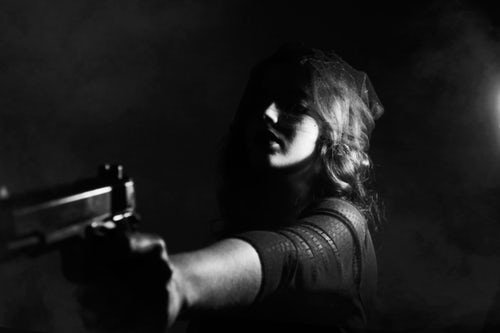Ranting About a General's Speech and "the State's Monopoly on Legitimate Violence"

Earlier today, I fell into a rabbit hole of YouTube recommendations and I ended up watching a video (titled "Peter van Uhm: Why I chose a gun") which kind of disturbed me. I was clicking on whatever looked interesting and I found this recording of a Dutch general speaking to an audience about why he "chose the gun" as the implement with which he serves his purpose in life. The gun, of course, was a symbol for the broader concepts of violence and force. On the surface, his agenda was pretty standard fare for a person who is cheerleading for his military. He told a war story that demonstrates the need for funding and asked the crowd to support their military service members. It was pretty much what one would expect to hear from any professional soldier in any country, I suppose. However, there was more hiding beneath the nice little speech. False premises were presented as though they are universal truth and, ultimately, this man's explanation of why he "chose the gun" served as a defense of authoritarianism and a promotion of the use of force in the name of the authority. I don't think that there is anything unique about this speaker's stance. What he says is not particularly uncommon for one who is part of the system of control but it provided a rather clear window into the mindset of an authority; so I wanted to unpack some of the concepts that he subtly pushes and give my thoughts on why I find them to be harmful.
Now, I don't want to appear like I am just picking on General Peter van Uhm. He happens to be the one giving the speech but the ideas that he expresses could have come from any representative of a system of authority. I have heard the same types of talking points used by American, British, and various other countries' politicians and military leaders. There is nothing personal about my choice of source material but it does happen to serve as a great example of what these types of authorities would like us to believe. However, I do want to point out that not everything the general said is negative and I would be remiss if I failed to mention that it was an interesting and effective speech but I strongly disagree with the premises he builds his position upon.

General Peter van Uhm begins by equating the act of making war with things like science and art. In the sense that all of those things are activities that a person could engage in, it is true a true statement. However, when we look at what these things do, we can see a very obvious difference. That is, while art and science are acts of creation (creating things or creating knowledge), war is an act of destruction. I, personally, am not a pacifist (though, I do oppose the use of violence in the vast majority of situations) but I take issue with this blurring of the boundary between creation and destruction. The two are not equivalent and their effects are polar opposites. By trying to categorize these two very different concepts together, the general diminishes the negativity of war, violence, and force, thereby making them seem more acceptable in the mind of a listener. Interestingly, this premise is just thrown in to his line of reasoning as though it is something that everyone "knows" to be true which, I believe, is a tactic that is used to avoid scrutiny of a concept.
The idea that really struck me as dangerous in General van Uhm's speech came in two parts. First he, essentially, makes the claim that violence, when committed by a state which is not "failed" (he conveniently never defines this term), is "legitimate." He uses phrases like "democratically elected" to help soften the rather insidious belief that a "good" government cannot misuse force. Obviously, this viewpoint is highly flawed. In my own country (the U.S.), having "free" and "democratic" elections did not prevent us from committing genocide against the native peoples of this continent. Few would argue that the slaughter of the American Indians was a positive use of force. To put it simply, the general's premise is a non sequitur and a dangerous one at that. A particular type of government is not always more just than another and all of them are capable of committing atrocities. If people actually take what he has to say to heart, they will begin to believe that any act of violence that is committed by a state is justified because it has been committed by a state. In effect, this removes population's desire to question the use of force by the authorities and when people stop questioning things, corruption and exploitation go unchecked.

The other half of the message that Peter van Uhm presents is that the state is the only source of "legitimate" violence which preemptively demonizes any resistance to the force that is applied by it. Throughout his speech, the general keeps returning to the phrase "monopoly on legitimized violence" or some variation thereof. Now, think about what this means. It says that only the force that is applied by the state can ever be justified. Let's extend this to the example that I gave earlier. If only the state is capable of justly using force, then the Native American peoples had no right to even try to defend themselves. Through this flawed lens, the wars between the indigenous inhabitants and the American settlers stop being conflicts between two (well, actually many different tribes but for the sake of convenience I will group them all together) peoples and start looking like the "just" and "righteous" state fighting against "dangerous criminals," "terrorists," or what have you . When this concept becomes part of a cultures collective consciousness, any resistance to the abuses that are committed by the authorities is rendered ineffective because the masses will see it as standing in opposition to the "legitimate" actions of the state.
.jpg)
This speech, of course, is nothing to get fired up about. The general isn't going to single handedly sell the idea of authoritarianism and "legitimate violence" to the masses. However, I do believe that the attitudes that he expresses and the ideas that he puts forward are in line with those of the people who seek to control us all by force. They want us to believe that they are always justified in their violence. They want us to dismiss anyone who resists them. Finally, they want us to submit to their power without question. If we are to ever stand against those would oppress us, we must be aware of the concepts that they will try to push on the people. Pay attention to what the authorities have to say and really think about what it means. Sometimes, you will find that they try to slip ideas past you by stating them like are the truth but if you can see what they are doing, their sophistry will have no effect on you.
Peace.
The video that I reference in this post is titled "Peter van Uhm: Why I chose a gun" and can be found on YouTube
All the images in this post are sourced from the free image website, unsplash.com.
"Monopoly on legitimized violence" sounds like something the Yakuza or Mafia would state. Rather it sounds like something Nixon said during one of the Frost interviews. In effect, I don't remember the exact phrasing but it was similar to: "when the president does it, it is not illegal." George Washington or Andrew Jackson would have said the same while "the wars between the indigenous inhabitants and the American settlers stop being conflicts between two ... peoples and start looking like the 'just' and 'righteous' state fighting against 'dangerous criminals,' 'terrorists,' or what have you."
Peter van Uhm has demonstrated that "settler-colonialism" as a concept is alive and well in human society regardless of country. "Why I chose a gun" is it makes my purpose of life easier if it is "legitimatized" by the state. God, bless ________ (fill in the blank with whichever state can commit "legitimate" violence).
Yeah. There are a ton of examples of that attitude. I think Peter van Uhm was just a little easier to see through because he isn't a propagandist by trade. His bs isn't as polished as the stuff that we are used to hearing so it struck me even though I was only half watching the video the first time I played. Then I went over it again and actually listened to what he was saying and it seemed pretty wrong to me.
Haha Jackson always comes up. It is bad when Davy Crockett, who bragged endlessly about how many indians he killed and admits to eating potatos cooked in human fat (he tells that story in his book), says that the way Jackson treated the indians is too harsh.
Good ole Davy Crockett, "King of the wild country." Or whatever was one of the lines in the stupid song written for the Disney films during the early years of the Cold War. Who the fuck played him? Oh yeah, Fess Parker; the same dick that played Daniel Boone for the patriotic lovefest show in the early 60s. That old beat goes on: victors who eat potatoes in human fat become "legends" for little boys to emulate. "Why I chose a gun." Settler-colonialism is alive and well. As Dylan wrote when he still could show concern: "bury the rag deep in your face, for now is the time for your tears."
upvote for me please? https://steemit.com/news/@bible.com/6h36cq
@artisticscreech Thank you for not using bidbots on this post and also using the #nobidbot tag!